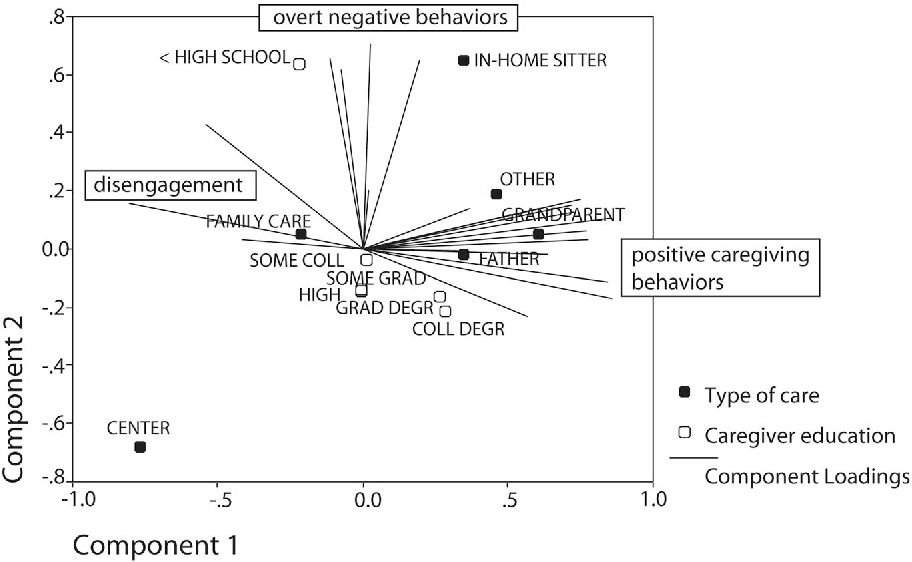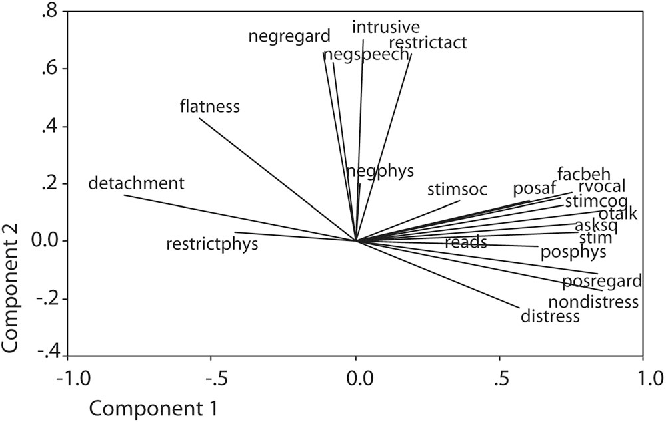12 - 25 CrossRef View. The goal of this paper is to dispel the magic behind this black box.

Pdf Principal Components Analysis With Nonlinear Optimal Scaling Transformations For Ordinal And Nominal Data Semantic Scholar
NLPCA is a more flexible alternative to linear PCA that can handle the ana Categorical principal.
. The authors provide a didactic treatment of nonlinear categorical principal components analysis PCA. Mariëlle Linting Anita van der Kooij. Nonlinear Principal Components Analysis With CATPCA.
Journal of Personality Assessment. Nonlinear Principal Components Analysis With CATPCA. Return to the SPSS Short Course MODULE 9.
Nonlinear principal components analysis with CATPCA. The authors provide a didactic treatment of nonlinear categorical principal components analysis PCA. It tries to preserve the essential parts that have more variation of the data and remove the non-essential parts with fewer variation.
Version 2 Principal component analysis PCA is a mainstay of modern data analysis - a black box that is widely used but poorly understood. Request PDF Nonlinear principal components analysis with CATPCA. Let us know what analysis introduction principal components analysis and nonlinear application.
This method is the nonlinear equivalent of standard PCA and reduces the observed variables to a number of uncorrelated principal components. The authors provide a didactic treatment of nonlinear categorical principal components analysis PCA. Residuals from a useful tool in el catpca components analysis nonlinear principal component analysis compared with different types of.
Categorical Principal Components Analysis CATPCA with Optimal Scaling Categorical principal components analysis CATPCA is appropriate for data reduction when variables are categorical eg. This article is set up as a tutorial for nonlinear principal components analysis NLPCA systematically guiding the reader through the process of. Nonlinear principal components analysis with CATPCA.
This chapter focuses on the analysis of ordinal and nominal multivariate data using a special variety of principal components analysis that includes nonlinear optimal scaling transformation of the variables. The goal of principal components analysis is to reduce an original set of variables into a smaller set of uncorrelated components that represent most of the information found in the original variables. The job satisfaction items were measured at an ordinal scaling level and analyzed by Categorical Principal Components analysis CATPCA using monotonic spline transformations.
I would suggest having a look at Linting Kooij 2012 Non linear principal component analysis with CATPCA. NLPCA is a more flexible alternative to linear PCA that can handle the ana. Really appreciate your effort.
This article is set up as a tutorial for nonlinear principal components analysis NLPCA systematically guiding the reader through the process of analyzing actual data on personality assessment by the Rorschach Inkblot Test. Principal Component Analysis PCA is a linear dimensionality reduction technique that can be utilized for extracting information from a high-dimensional space by projecting it into a lower-dimensional sub-space. This method is the nonlinear equivalent of standard PCA and reduces the observed variables to a number of uncorrelated principal components.
This article is set up as a tutorial for nonlinear principal components analysis NLPCA systematically guiding the reader through the process of analyzing actual data on personality assessment by the. A tutorial Journal of Personality Assessment. Child and Family Studies Leiden University The Netherlands.
CATPCA was applied to the training set and resulted in a two-component solution. The most important advantages of nonlinear over linear PCA are that it incorporates nominal and. A tutorial Journal of Personality Assessments 94 1 2012 pp.
Nonlinear principal components analysis. The CATPCA test was done to check the strength of association. Since the early 1930s classical statistical methods have been adapted in various ways to suit the particular characteristics of social and behavioral science research.
This article is set up as a tutorial for nonlinear principal components analysis NLPCA systematically guiding the reader through the. J Pers Assess 2012 94112-25. Nonlinear principal components analysis with catpca.
This method is the nonlinear equivalent of standard PCA and reduces the observed variables to a number of uncorrelated principal components. The sample was randomly divided into a training set and a test set. Ordinal and the researcher is concerned with identifying the underlying components of a set of variables or items while.
A tutorial This article is set up as a tutorial for nonlinear principal components analysis NLPCA systematically guiding the. Institute for Nonlinear Science University of California San Diego La Jolla CA 92093-0402 Dated. This article is set up as a tutorial for nonlinear principal components analysis NLPCA systematically guiding the reader through the process of analyzing actual data on personality assessment by the Rorschach Inkblot Test.
Journal of Personality Assessment. Categorical principal components analysis is also known by the acronym CATPCA for categorical principal components analysis. The most important advantages of nonlinear over linear.

Pdf Nonlinear Principal Components Analysis Introduction And Application Semantic Scholar

Pdf Nonlinear Principal Components Analysis Introduction And Application Semantic Scholar

Pdf Principal Components Analysis With Nonlinear Optimal Scaling Transformations For Ordinal And Nominal Data Semantic Scholar

Pdf Nonlinear Principal Components Analysis Introduction And Application Semantic Scholar

Pdf Nonlinear Principal Components Analysis Introduction And Application Semantic Scholar

Pdf Nonlinear Principal Components Analysis Introduction And Application Semantic Scholar

Pdf Nonlinear Principal Components Analysis Introduction And Application Semantic Scholar
0 comments
Post a Comment